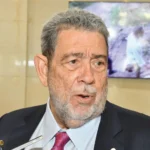Lewis Capaldi has announced a further break from performing live after struggling to sing through his Tourette’s symptoms at Glastonbury on Saturday – in a move he branded ‘the most difficult decision of my life.’
The singer, 26, took to social media on Tuesday to announce that he will not be touring ‘for the foreseeable future’ as it is ‘obvious’ he needs to spend ‘much more time getting my mental and physical health in order.’
The Scotsman had already taken three weeks off before his gig on the Pyramid Stage at the weekend, but today admitted it was not enough and that he was ‘still learning to adjust to the impact of my Tourette’s.’
The hitmaker became emotional as he started losing his voice during the performance, prompting him to apologise to the crowds – who then helped him finish his songs in heartwarming footage that quickly went viral.
But posting on Instagram on Tuesday, Lewis confirmed that he was cancelling the planned 24 live dates he had scheduled for the rest of the year.
Hello everyone. First of all thank you to Glastonbury for having me, for singing along when I needed it and for all the amazing messages afterwards. It really does mean the world,’ he began.
‘The fact that this probably won’t come as a surprise doesn’t make it any easier to write, bit I’m very sorry to let you know I’m going to be taking a break from touring for the foreseeable future.
‘I used to be able to enjoy every second of shows like this and I’d hoped 3 weeks away would sort me out. But the truth is I’m still learning to adjust to the the impact of my Tourette’s and on Saturday it became obvious that I need to spend much more time getting my mental and physical health in order, so I can keep doing everything I love for a long time to come.’
‘I know I’m incredibly fortunate to be able to take some time out when others can’t and I’d like to thank my amazing family. friends, team, medical professionals and all of you who’ve been so supportive every step of the way through the good times and even more during this past year when I’ve needed it more than ever.’
‘I’m so incredibly sorry to everyone who had planned to come to a show before the end of the year but I need to feel well to perform at the standard you all deserve. Playing for you every night is all I’ve ever dreamed of so this has been the most difficult decision of my life. I’ll be back as soon as I possible can. All my love always, Lewis’.
Lewis had 24 remaining dates scheduled for his Broken by Desire to Be Heavenly Sent tour, ending in Belfast at Boucher Road Playing Fields on September 3.
Abbas Kanani, a superintendent pharmacist at Chemist Click Online Pharmacy, told MailOnline today that the length of Lewis’s break would depend on his own specific needs.
He said: ‘Longer or physically demanding performances may necessitate more frequent or extended breaks to help the performer manage their tics and prevent fatigue.
‘Some performers may prefer shorter, more frequent breaks, while others may prefer longer breaks less frequently. Professionals will take into account their overall physical and mental stamina, tic patterns and length of performances to determine appropriate break durations.’
He added: ‘Performing on stage can bring about a range of emotional responses such as excitement, anticipation, stress and anxiety which can all be triggers for tics.
‘Additionally, certain sounds, smells or sensory stimuli may also influence the frequency and intensity of tics.
‘Touring can also impact a performer’s sleep pattern, often leaving them sleep-deprived and this can lead to tics becoming more frequent or pronounced.’
Mr Kanani said that managing tics while performing can be ‘challenging’, but said there are strategies that can help.
He said deep breathing exercises, relaxation techniques or engaging in activities that promote focus and relaxation can be beneficial pre-performance.
He explained: ‘This may help to manage anxiety and reduce tic severity. If he experiences temporary periods of tic reduction or remission, known as “tic-free windows”, scheduling performances during these periods could help minimise the impact of tics.
‘Switching the focus on specific aspects of the performance, such as musical notes or lyrics or using mental imagery techniques to redirect attention helps some people.’
Fans rallied around the star after footage of him struggling to sing at Glastonbury due to his Tourette’s symptoms went viral online.










